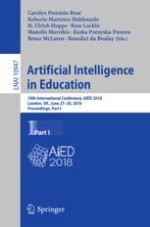2018 | OriginalPaper | Chapter
Reciprocal Kit-Building of Concept Map to Share Each Other’s Understanding as Preparation for Collaboration
Authors : Warunya Wunnasri, Jaruwat Pailai, Yusuke Hayashi, Tsukasa Hirashima
Published in: Artificial Intelligence in Education
Publisher: Springer International Publishing
Activate our intelligent search to find suitable subject content or patents.
Select sections of text to find matching patents with Artificial Intelligence. powered by
Select sections of text to find additional relevant content using AI-assisted search. powered by
